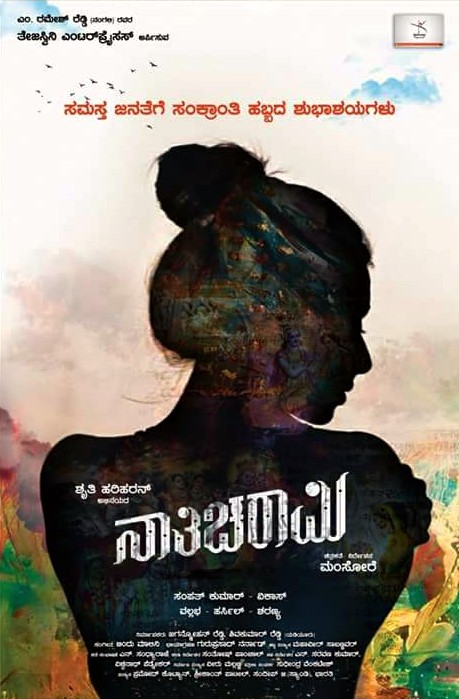Nathicharami

By-
Aishwarya Lakshmi
Rating

Sex and sexual desires are still talked about in hushed tones. Female sexuality is something whose existence itself is not acknowledged. Now, add to this a widow who tries to satisfy her sexual desires and is largely unapologetic about it. Then there is also a certain conflict between emotional devotion to her late husband and a burning sexual desire. This is the base storyline for this 113 minutes treat which sets the tone for it from the word go. It is apt to mention here that the film won a number of awards at the National Film Awards that particular year.
Gowri, played by Sruthi Hariharan, is a modern working woman who is a team lead at an IT firm. She and her now late husband Mahesh, played by Poornachandra Mysore, had love marriage for which both their parents were averse. After the death of her husband three years ago in an accident, she lives with all the amenities in place but a deep emotional void and unmet sexual desires. They shared a very intimate relationship conspicuous with all the wind chimes and photographs at her house which also makes her to loathe the remarriage proposals proffered by her parents.
Her colleague suggests her to consult Psychiatrist Dr. Carvaloh, played by Balaji Manohar, after she experiences a temperamental tongue-tie at her workplace. Certain one-liners from Dr. Carvaloh hit hard and are authentic while a few seem straight out of a profound philosophy textbook. After counselling from him, Gowri decides to settle her desires. She befriends Suresh, played by Sanchari Vijay, a Civil Engineer by profession who goes to the same park as hers for morning exercise. Suresh is a condescending yet relatable male, unhappy about his life with his wife, played by Sharanya, and yearns for city-based wife. Gowri and Suresh are like chalk and cheese, yet their friendship ultimately effectuates much-needed awareness in one and release from ardour in the other.
Sruthi Hariharan breathes her character and seems a perfect fit to play Gowri. Special mention of the simple yet elegant costumes that levitate her character. Sanchari Vijay shines as Suresh and oozes naturalness in his act. Just goes on to prove the now deceased actor’s mettle as a National award winning one. Sharanya has done a very convincing job and excels as a meek, vulnerable yet strong-willed housewife. Balaji Manohar as Dr. Carvaloh, Gopala Krishna Deshpande as Suresh’s friend with his comical antics, Shantala as Jayamma – the domestic help and all the other characters have done justice to their roles. Look out for an emotional scene with Gowri and her father-in-law, played by Kalagangotri Manju. It just shows how character artists shine even in the smallest of roles.
The film has been beautifully helmed by director Mansore. The wind chimes aptly reverberate the intent of the movie and conceal the few uncomfortable silences. There are many other concepts that are either just touched upon or explored in an enthralling fashion, be it consent, sexual harassment at workplace, how the world views women who ask for ‘it,’ self pleasuring and all of these are done aesthetically without a hint of awkwardness. The cinematography by Guruprasad Narnad is pleasant and Music by Bindhumalini is excellent. The compositions are intense and soothing at the same time and convey the intent of the main plot; special mention of ‘Maayavi Manave’ and ‘Dehavu Naane.’ The screenplay is a bit slow at times and lingers on a scene beyond the comfortable pause time.
A bold conceptualization and graceful depiction is a welcome change in the new-age cinema. A modern feminist tale entails consent, open discussion of needs, speaking up for oneself and not being shamed for all of these – which the movie does with utmost conviction. A great step toward gender sensitive cinema and an even bigger milestone in positioning female narratives at the national level. A definite recommendation to all the regional movie buffs to see the vast array of movies being made and embolden making of such content-driven cinema.
Disclaimer: The above review solely illustrates the views of the writer.


